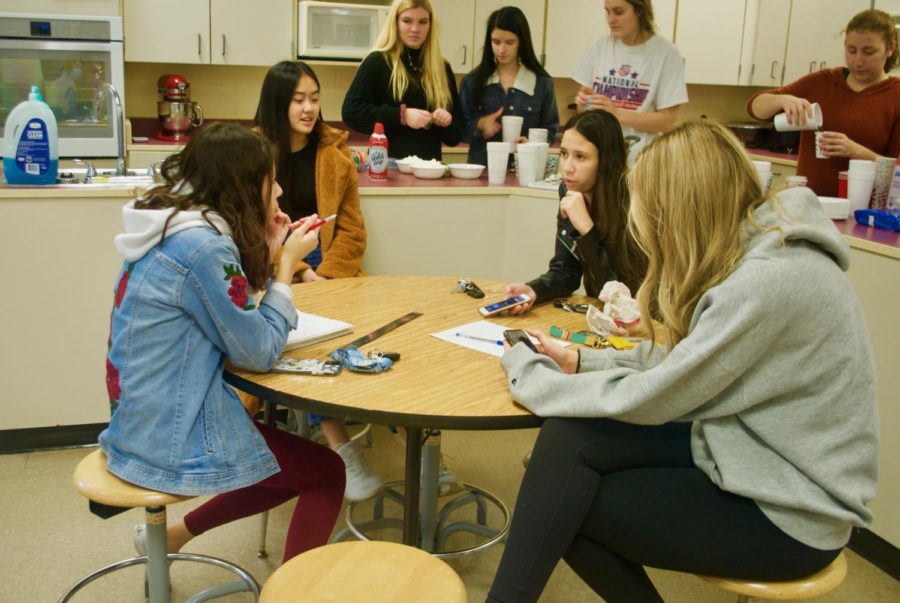Veteran volunteers voice how students can get involved in giving back
For those looking forward to leading a helping hand, volunteers at Wakefield give their insights on community service
After many volunteering opportunities this fall, FCCLA gathers for a holiday celebration.
December 20, 2019
“‘Tis the season of giving” is a phrase often ringing in the ears of locals as soon as the holidays usher their way into the Triangle. From serving up meals at local soup kitchens to participating at open toy drives to children’s hospitals, fulfilling the duty of giving back to one’s community is an action that not only improves the lives of others, but also reveals an opportunity for new participants to understand and interact with those around them.
While volunteering isn’t always a seasonal responsibility, its popularity has reached a spontaneous height since last year, and continues to be a favored pastime across the nation. However, such ratings exclude a percentage listing of Generation Z’s involvement giving back to their communities. Whereas Generation X and Baby Boomers take the top spot out of who volunteers the most, Millennials slowly climb up with them, but nothing is recorded on the involvement of the group who vastly takes up the population of Wakefield and other American schools. Whether students are disinterested or unable to commit to the pastime is uncertain, but this doesn’t mean that those who do devote their time to aiding others don’t exist.
One of the various school organizations that emphasize the importance of volunteering is the Wakefield Key Club. The purpose of the club is to allow students to lead and educate themselves as they commit their time to service across Wake County. Containing a vast amount of teenage members who succeed in such deeds, members of Key Club provide their perspectives on how participating with non-profit projects and drives reflected insight on themselves and the people they’ve affected.
Nicole Sommerdorf, a senior who currently serves as the vice-president of Key Club, has early experiences with collecting hours and exploring the many facets to giving back.
“I volunteered at a food pantry for the first time about four years ago, and now I am really close with [the staff] there,” Sommerdorf said. “I never would have done it without Key Club. It really aims to show others that community service is important, and we, as members of society, should value it more.”
Working alongside Nicole within this organization is Lisa Foster, a history teacher within Wakefield’s faculty. As the advisor of Key Club, she also has her own knowledge on why volunteering is beneficial, especially for students who really take interest in it.
“I think [volunteering] truly helps students understand elements of the world around them that they may not naturally be exposed to, so I believe it helps them engender more empathy for others,” Foster said. “It also helps them in branching out more within their community.”
Another organization within Wakefield that addresses its members’ volunteer experiences is the National Achievers Society, which acknowledges the academic achievement of minority students and focuses on aiding underprivileged groups when giving back. History teacher Jessica Chambliss has worked as the main advisor to the organization for five years. One place she suggests to volunteer at is the Miracle League, a non-profit organization that allows volunteers to play baseball with special needs individuals.
“They need to volunteer somewhere they enjoy and can actually make a difference at,” Chambliss said. “Volunteering at places like the Miracle League gets students excited about being volunteers, and some even go back without hours in mind. Having students actually see the people they are helping will entice more students to want to help even more.”
Kayla Holloway, a current senior, has been in the National Achievers Society since her sophomore year at Wakefield. As the president of the organization, she also shares what students should remember when volunteering and why the devotion to giving back can be beneficial.
“They need to keep in mind why they are doing [community service], not just for hours or anything like that,” Holloway said. “They need to know that this is not only helping the community but also helping themselves.”
Of these seasoned helpers of the less fortunate, there are a variety of ideas on how to raise student interest regarding volunteering. Doing something that could affect you, or has affected one of your loved ones, is a strong start. Participating in drives and donation opportunities at school is another excellent way to get involved. With each of these options in mind, potential volunteers within the latest generation seem promising from the standpoint of those who already selflessly give to those in need. As the holidays come and go, it is pivotal to remember that taking the time to help a fellow Raleigh resident doesn’t have an expiration date. Regarding the input from the volunteers at Wakefield, it is safe to say that every season is the season to give.
“I love seeing the faces of the people we help, which makes me want to help more people across Wake County,” Chambliss said. “Giving back to the community is so important because, in this day and time, we need to show the communities that people care for them.”
VOLUNTEERING OPPORTUNITIES AND ORGANIZATIONS
Miracle League of the Triangle: The Spring Semester begins in March! You may volunteer to participate for either the Youth division, Adult division or both on the same day! From choices like DJ to Scoreboard Operator to Buddy, the opportunities you can find at the Miracle League are endless!
The Green Chair Project: The Green Chair Project devotes their time to offering and accepting donations for furniture to those recovering from homelessness or natural disasters. Volunteers are capable of providing donations of their own and apply as regular or occasional aids to their cause!
Raleigh Rescue Mission Thrift Store: Volunteers are capable of donating spare clothing of their own, or providing their own time for service through working within the thrift store itself. Proceeds within the establishment go towards those who combating homelessness.
Raleigh Parks, Recreation, and Cultural Resources: A variety of events spur within the spring, regarding the Raleigh Parks, Recreation and Cultural Resources organization. From Easter Egg Hunts with kids to placing down new wood chips and mulch for local parks, all it takes is a simple waiver form for volunteers to get into the mix!
NAS’s Winter Clothing Drive: On the week of January 6th to January 10th, the National Achievers Society will be holding a Winter Clothing Drive for students to openly donate proper winter clothing for the less fortunate during the more frigid months of the year. Further information on what items are allowed will be issued out by the organization itself.









